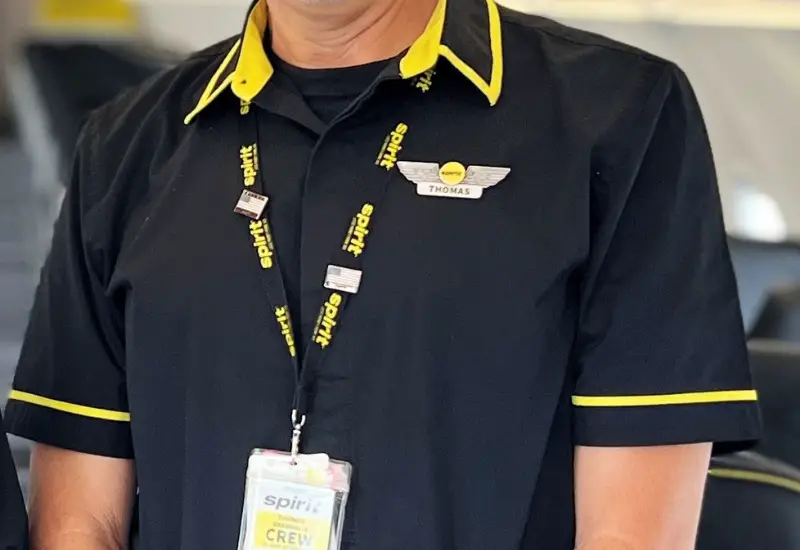One of the many steps required to become a Spirit Flight attendant is passing a 4-week initial training where you’ll learn all the duties of being a flight attendant. It may seem a bit daunting at first, but it’s not impossible.
I have done that training myself, so hopefully, this guide can give you some insight about what Spirit training is like and put your mind at ease.
Where is the training held?
Training is usually held in one of these 3 bases: Las Vegas, Orlando, or Fort Lauderdale.
How long is training?
Initial training will span over 4-weeks.
Is training paid?
If you successfully complete training, you will be paid. I’m not quite sure how much, but there is a new sign-on bonus incentive of $1,500.
If you are sent home anytime sooner, you get nothing.
What is the dress code?
Trainees are required to wear business casual attire in black and/or yellow.
Spirit will not supply trainees with anything to wear. It’s up to you to bring what you need.
Sneakers and jeans are not acceptable. Heels are optional.
Hair must be well-groomed, and makeup and nails may not be extreme styles.
You’re absolutely free to express your personal style, but remember, this is not a fashion show.
And when in doubt, keep it simple.
What are the food options?
Trainees are in charge of getting their own breakfast, lunch, dinner, and anything else in between.
Spirit will not supply any food sufficient enough to be a meal. They may have little snacks here and there, but it’s really up to you to make sure you have what you need.
If you’re lucky enough, the hotel you are placed at may have complimentary breakfast, but it’s not required nor guaranteed.
However, Spirit will give all trainees a “care card”.
A “care card” is something Spirit has implemented in the last few years. It’s basically a card that trainees can use toward food.
I believe there’s a daily maximum use of $75. Anything costing over that amount may result in your card being denied or you having to pay the remainder out-of-pocket.
What’s an average scheduled day at training?
Classes will most likely be split up into either a morning class or evening class.
Classes have been so big lately that there have been 2 or 3 morning classes. You don’t get to choose which class you’d like to be in. They will just assign you.
Morning classes will usually begin at either 6 am or 7 am, and end at 2 or 3 pm.
Evening classes will go from 3 pm-12 am. You will be given little 10-15 minute breaks throughout and an hour lunch.
You’ll rarely ever get out earlier than your scheduled time.
Each class you’ll go over a new section. Most lessons will be PowerPoints, but there may be some role-playing as well.
For example, when going over how to take care of certain guests or flight routines, the instructor may have volunteers in the class act out the different roles in the scene.
Each type of class has its pros and cons:
- Morning classes get class out the way early and when they get out, they still have a good chunk of their day to do whatever they need to do (i.e. study, go get food, workout, sleep), but it may be harder to stay awake during class – especially if you’re not a morning person.
- Evening classes had the luxury of sleeping in, but you feel like your whole day is spent in class. I was in an evening class and even though you had time before class started, sometimes you would just be so drained from class the night before that all you wanted to do was sleep so that you had enough energy for class.
How hard is Spirit flight attendant training?
The difficulty of training is relative. I didn’t feel like it was hard at all, but some people said it was the hardest thing they’ve gone through.
If you struggle with memorizing information, you may have some trouble.
There are drills you need to memorize as well as all the rules and regulations.
When you are being tested on your drills, you perform them in a mock airplane in front of an instructor and you get 2 attempts.
Tests are given every week on whatever sections you learn.
If you don’t consider yourself a good test-taker, don’t let that scare you off just yet. You only need a passing score of 90%, and if you don’t pass the first time, you can take it again one more time.
In your fourth and final week of training, you will take a final test that will cover everything you’ve learned over the past 4 weeks. Just like the other tests, you only need a passing score of 90%.
However, you only get one shot at this one.
If you pass your final, the last step before becoming an official flight attendant will be your IOE (inflight operational experience).
This is where you’ll actually get to work as a flight attendant.
However, since you’re not officially a flight attendant quite yet, there are some duties you won’t be allowed to perform, but may still be tested orally on (i.e. arming the doors and emergency/medical situations). You will make announcements, assist guests, and do cabin service.
Do I need to prepare for training?
I feel like it’s best to go in as a blank slate.
You don’t need any prior flight attendant training or experience.
It’s great being familiar with the process, but keep in mind that having any previous knowledge might confuse you because you’ll have to unlearn your old ways, and learn the new ways.
The only other preparations I would recommend would be to just make any necessary arrangements to make sure that any responsibilities you have back home will be taken care of while you are away.
Whether that means having someone watch your kids, dogs, or plants. You’re already going to have a lot on your plate from training alone. The last thing you need is worrying about things at home too.
When do you get to choose your base?
You put in your top 3 choices during your first week, and you find out by week 3.
After the training, what’s the time frame to start working at your assigned base?
It’s quite quick. Once you have successfully completed training, you have 4 days before you start working at your assigned base.
After being away for a whole month, it’s completely understandable why most people opt to go straight home for their 4 days after training.
However, if you don’t live in base, keep in mind that you may need to use a day to get to base.
So even though you have 4 days off, it may actually only be 1 true day off because of any traveling you may need to do.
How long is the probation period?
Probation will be 6 months from your graduation date.
That’s different from your hire date.
Your class will all have the same hire date, but everyone will have different graduation dates simply because it’s impossible for everyone to do their IOE on the same day.
Advice to newcomers
- Make sure your required items are charged and don’t be late. You can literally get sent home for your device being 1% under what it’s supposed to be. You can also be sent home for being late to training. I recommend being down at the shuttle at least 5 minutes before you’re supposed to be there.
- Be good and follow the rules. I know that may seem obvious but people have been sent home for breaking simple rules like “don’t allow anybody in your room.” In training, you’ll be placed in a room with a fellow trainee of the same sex. You are not allowed to have anyone else in your room during training. Not your boyfriend. Not your mom who’s visiting. Not even your fellow trainees except the one that is assigned to that room. It’s a simple rule that’s not worth breaking and risking being sent home.
- If you get put in an evening class, I highly recommend bringing your food or plan for it to be delivered in the morning before you have to head to class. If you don’t expect to eat pizza every night. Getting out at midnight meant that most delivery places were closed, and the hotel restaurant and restaurants nearby will most likely be closed as well. So make a trip to the grocery store if you can, and get some food. I bought a loaf of bread, peanut butter, and deli meats.
- It’s worth mentioning that you can be sent home at any time during training. Obviously, you can be sent home for failing drills or tests, but you may also be sent home for things that can occur outside of the classroom.
Before you think that’s unfair, just remember that when you are sent out for training, you are doing so under Spirit. You are a representation of the company. So be careful of how you act – especially at the hotel. - Make sure not to take photos and post any material you may be studying. Doing so could accidentally give out confidential information. Don’t post anything that could put you, your classmates, or Spirit at risk. In this age of technology, you have to be careful of anything you post on social media because it could cost you the job.
- Study in groups. I know there are people who love to study on their own, but this is a job where you’ll be working as a crew. So help each other out. You may be confident that you know your stuff, but someone else may not. Sometimes you don’t know what you don’t know. So get in groups and test each other.
- Speaking of helping each other. Also, genuinely be there for each other. Some people are going to be sacrificing a lot to be there. Maybe they are going to be away from their 2 year old baby. Some people will have such bad anxiety that each day is going to be a battle to just make it to class. Check in with each other, and be more than just a classmate if you can.
- My last piece of advice is crucial: try to have some fun. I know the pressure of being sent home at any time can be a lot. You may vow to laser-focus on training only. No distractions. No to having any fun during training, but I don’t recommend that at all. It’s ok to have a glass of wine while you practice your drills by the pool. It’s ok to celebrate you all passing your first test. Celebrate the little wins on your flight attendant journey. If you don’t, you might lose sight of why you’re doing this at all.







Spirit is a wonderful airline and gives people the chance to fly that could not afford to.
They do not hold age against you spirit appreciates your customers service skills and your ability to do a great job
I am very excited just want to know when will you get your record locator to check in for your flight to training
Richie
I was with Delta for 29 years I was very nervous during the evacuation drills and got sent home I tried to reach out to Allan the instructor I was scared of being sent home during the entire time I was there I failed the evacuation drills I have worked the aircraft airbus 319 320 321for many years
Knew how to open the door knew how to disarm the door they made it so complicated I left things out and failed the exams, they sent me home. Three people were sent home for failing a test twice. I realize the instructors have a job to do however being under the pressure of getting sent home and going through training with no retakes I was very nervous now after experiencing what they want I would do a great job. However the staff never returns calls. Out of sight, out of mind. I want to fly for Spirit in the worst way. Ronda Jordan is the head of training. I emailed her and poured my heart out, she never answered my emails.
Or never called me. Gave her my email and cell number.
Again, poured out my heart but was ignored, being at home it made me feel so horrible.
The staff on the way back to Cleveland was wonderful on the flight they could not do enough for me.
Hope Spirit reads this and gives me a break. I am a great flight attendant, had approximately 1 million customer recommendations in my file, was given the title of Ambassador for Delta Airlines by CEO Ed Bastian.
I would do handstands for Spirit I know exactly what they want in training.
I just want someone to return a phone call and talk to me.
Spirit is a wonderful airline and I get tired of people bad-mouthing them because an airline is only as good as the flight attendant working the flight.
Richie
The management at spirit is very understanding they treat their flight attendants with the same kindness that they want you to give to a customer ware your wings with great pride and stand tall and take care of your uniform pieces I recommend using a dry cleaner.
If one gets hired by spirit walk tall be proud, have a lot of spirit.
and be dedicated to your airline be courteous and helpful you are representing a great airline that goes the extra mile to help in the communities the fly to. Enthusiasm and dedication and pride are very important and loyalty is extremely important.
Thanks Richie Bayne